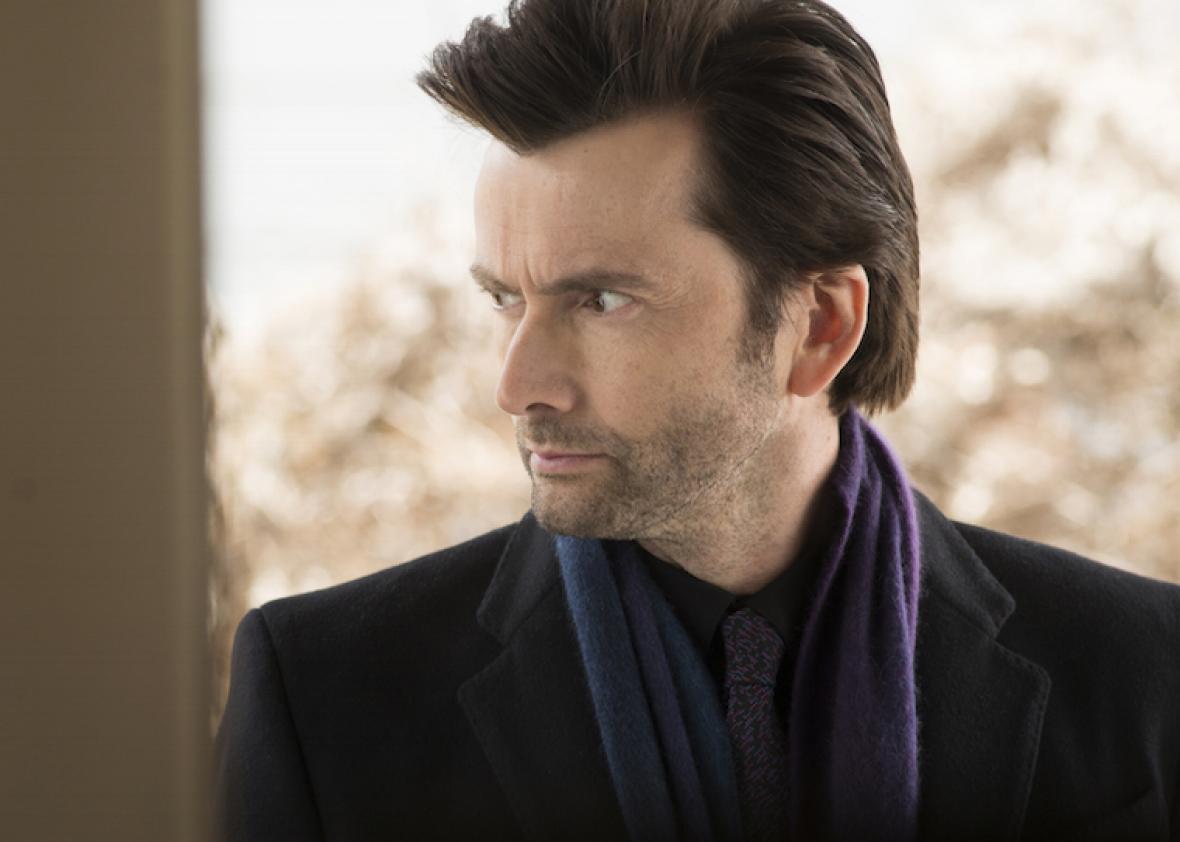The villain in the gripping Jessica Jones, the latest Netflix and Marvel collaboration, is not a super-being with ambitions to destroy or conquer the world. In the scheme of Marvel bad guys, this makes Killgrave (David Tennant) small fry. He’s a conscienceless, remorseless, relentless psychopath, a posh Brit with expensive tastes. He abuses his power of mind control to get whatever he wants: good wine, good food, fancy clothes, money, sex, distraction, total obedience, Jessica Jones (Krysten Ritter). Relative to world domination, the slaughter of thousands, the destruction of major metropolitan areas, these desires sound pedestrian. Killgrave doesn’t warrant The Avengers assembling. And yet he is terrifying and unsettling, far more so than any of the villains the cinematic Avengers has faced. The evil is in the details.
Killgrave can make anyone do anything he wants, just by suggesting it. He can approach a man on a subway platform wearing a Zegna coat and say to him, “You want to give me your jacket,” and the man will hand over his jacket. He can ask a concert cellist to play for him for a week, until her hands are bloody and raw and he has heard enough. He can climb inside a man’s car and tell the man he “wants” to leave his infant son in the street, and the man will do so. In these moments, Killgrave’s victims feel that they want to do whatever he is asking, while a tiny, helpless part of them knows they do not.
Killgrave is a walking consent metaphor: His power is to extract consent from people who are, in fact, helpless to give it. His victims appear willing, but how can you be willing, when you have no free will? Killgrave is literally a rapist. As the show begins, Jessica Jones is a wreck, still recovering from months spent in Killgrave’s thrall, doing his every bidding, which included copulation. But he is also figuratively a rapist. Every person he brainwashes he violates, entering their minds and forcing them to do what he wants, regardless of their desires. When Killgrave is done with his victims, hardly anyone believes them. Brainwashing? Please, that’s just an excuse. They made no fuss, no fight. In the aftermath of Killgrave, his victims can barely believe themselves, haunted by what happened and sick at the ease with which they were made to betray themselves.
When Killgrave appears, Jessica Jones becomes almost unbearably claustrophobic. Your stomach may drop. Jessica is not a means to an end for him, she is the end. All he wants is her. To get her he compels people to murder and commit suicide. He has a cop exit through the balcony. He makes a stranger toss a cup of steaming coffee in his own face. He has a man run his head into a column until the column breaks, or the head does. After Jessica escapes from him, Killgrave distracts himself with a college co-ed, whom he slowly extracts from her family and friends. When Jessica discovers her, she is in a hotel room in a urine-soaked bed. Killgrave commanded her not move and she obeyed.
In his review of Jessica Jones, Jack Hamilton described the show as feeling “more genuinely adult than anything Marvel has produced to date.” Killgrave is one of the major reasons for this. He’s an adult bogeyman, one who forces viewers to pay attention to the lives he destroys, disturbs, and invades, rather than an all-powerful bad guy who encourages audiences to forget about collateral damage in the thrill of huge explosions that have vast theoretical body counts but hurt no real people, just extras with a line or two. In the transition from the big screen to the small, Jessica Jones has created a terrifying villain who is just the right size to keep you up at night.
